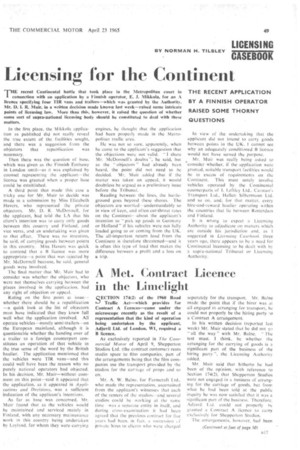Licensing for the Continent
Page 51

If you've noticed an error in this article please click here to report it so we can fix it.
THE RECENT APPLICATION BY A FINNISH OPERATOR RAISED SOME THORNY QUESTIONS
'THE recent Continental battle that took place in the Metropolitan court in 1 connection with an application by a Finnish operator, E. J. Mikkola, for an .A licence specifying four 'rig vans and trailers—which was granted by the Authority, Mr. D. I. R. Muir, in a written decision made known last week—raised some intricate points of licensing law. More than this, however, it raised the question of whether some sort of supra-national licensing body should be constituted to deal with these matters.
In the first place, the Mikkola application as published did not really reveal the true extent of the facilities sought, and there was a suggestion from the objectors that republication was necessary.
Then there was the question of base, which was given as the Finnish Embassy in London until—as it was explained by counsel representing the applicant—the licence was granted when a proper base could be established.
A third point that made this case a tricky one for Mr. Muir to decide was made in a submisSion by Miss Elizabeth Havers, who represented the private objectors. Mr. D. R. McDonnell, for the applicant, had told the LA that his client's intention was to carry only goods between this country and Finland, and vice versa, and an undertaking was given to that effect. There was no intention, he said, of carrying goods between points in this country, Miss Havers was quick to contend that a B licence was more appropriate—a point that was rejected by Mr. McDonnell because, he said. general goods were involved.
The final matter that Mr. Muir had to consider was whether the objectors, who were not themselves carrying between the places involved in the application, had any right of •objection or appeal.
Ruling On the first point at issue— whether there should be a republication —a quick look at the list of objectors must have indicated that they knew full well what the application involved. All operate vehicles—mostly semi-trailers-on the European mainland, although it is questionable whether the handing over of a trailer to a foreign counterpart constitutes an operation of that Vehicle in the true sense of the word by the British haulier. The application mentioned that the vehicles were TIR vans—and this could well have been the reason why no purely national operators had objected. In his decision, Mr. Muir—without comment on this point—said it appeared that the application, as it appeared in Applications and Decisions, was a sufficient indication of the applicant's intentions.
As far as base was concerned. Mr. Muir found that as the vehicles would be maintained and serviced mainly in Finland, with any necessary maintenance work in this country being undertaken by Leyland, for whom they were carrying engines, he thought that the application had been properly made in the Metropolitan traffic area.
He was not so sure, apparently, when he came to the applicant's suggestion that the objections were not valid. '' I share Mr. McDonnell's doubts '', he said, but as the " objectors" had already been heard, the point did not need to be decided. Mr. Muir added that if the matter was taken on appeal, it would doubtless be argued as a preliminary issue before the Tribunal.
Reading between the lines, the battleground goes beyond these shores. The objectors ate worried—understandably so in view of keen, and often cut-throat rates on the Continent--about the applicant's intention to "pick up goods in Germany or Holland " if his vehicles were not fully loaded going to or coming from the UK. The all-important return load from the Continent is therefore threatened—and it is often this type of load that makes the difference between a profit and a loss on a trip. In view of the undertaking that the applicant did not intend to carry goods between points in the UK, I 'cannot see why an adequately conditioned B licence would not have served the purpose.
Mr. Muir was really being asked to consider whether, if the application were granted, suitable transport facilities would be in excess of requirements on the Continent. This must surely involve vehicles operated by the Continental counterparts of I. Lefiley Ltd., Carman's Transport Ltd., Hallett Silbermann Ltd. and so on, and, for that matter, every hire-and-reward haulier operating within the countries that lie between Rotterdam
and Finland.
It is wrong to expect. a Licensing Authority to adjudicate on matters which are outside his jurisdiction and, as I suggested in Licensing Ca.whook three years ago, there appears to he a need for Continental licensing to be dealt with by a supra-national Tribunal or Licensing Authority.




































































































































